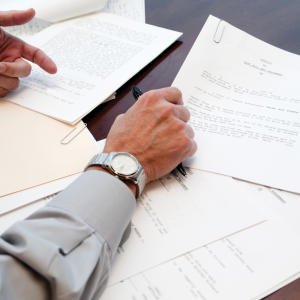08 Apr What Makes A Will Valid? Where There Is A Will, There Is A Way
Is a photocopied form signed by the testator (the one who makes the will), before 2 witnesses a valid will? What if the will is only initialed by the testator? What if the testator signs with an “X”? What if the will was signed by only 1 witness, but the will was notarized? The answers may surprise you, but in some cases the answer to the questions above as to whether the will is valid or not is “yes” (although sometimes more proof is required).
Under Texas law, an attested will must be 1) in writing, 2) signed by the testator and 3) attested by two or more credible witnesses who are at least 14 years of age and who subscribe their names to the will in their own handwriting in the testator’s presence (which is not required if it is a handwritten will wholly in the testator’s handwriting). This raises a few questions:

- What is considered a “signature” of the testator?
The courts look to whether the testator intended a mark to constitute an expression of testamentary intent. Thus an “X” or only initials signed by the testator could be sufficient. - If the will an original or a copy?
There is a presumption that the will was destroyed (although this could be rebutted as more evidence and cooperation of heirs will be needed) if it is a copy. In these days where there are good copiers and notary stamps instead of raised seals, it is often difficult to determine what is an original and what is a copy. Often a special magnifying loop can be used to determine if the will is original or not (photocopies show dots). You might have to feel the signature to see if there was an indention. Also, if the notary stamp smears, the will is probably an original. - What if only one witness signs but the will is notarized?
The will would not be considered “self-proved”, but it could be valid if all other requirements are met. When the will is attested by 2 or more credible witnesses who are at least 14 years of age and who subscribe their own handwriting in the testator’s presence, then the will is considered “self-proved” and no witness is required when probating the will. Thus, if only one witness signed the will, the notary could be considered another witness although testimony would be required by the witness or notary to determine the will to be valid. - How do you know if the will is self-proved?
There are several ways that will make wills not self-proved including the following:
a) The witnesses have not sworn to the statement that they were over 14 and that they signed the will in the testator’s presence. If it isn’t “sworn to”, then it is not an affidavit.
b) The witnesses didn’t sign on the signature line (the notary just can’t print their names) of the affidavit.
c) In the notary’s statement at the end of the affidavit, there are blank lines (not filled) for the names of the testator and/or witnesses.
d) The affidavit is neither stamped nor has a notary seal (if it is an older will).
If the will was not self-proved, a subscribing witness must prove what happened when the will was signed, that the testator was of sound mind, that the testator was over 18 and the witnesses were at least 14 years of age.
Where there is a will there’s a way – it just may be more difficult to prove validity if not properly done. If the will is not valid, then assets would pass under the laws of intestate succession (which is often a more costly procedure and could differ than what you would have wanted).
If interested in learning more about this article or other estate planning, Medicaid and public benefits planning, probate, etc., attend one of our free upcoming Estate Planning Essentials workshops by clicking here or calling 214-720-0102. We make it simple to attend and it is without obligation.









